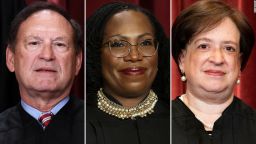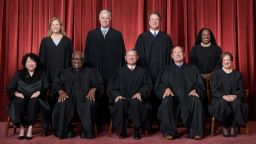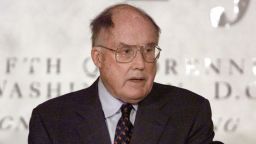At the Supreme Court, the conservative majority seems to have a new mantra that half way is no way.
From the beginning of oral arguments on Monday, it appeared the Supreme Court’s conservatives had come to the bench with their minds set. They sidestepped the lack of clear facts in the case, brushed off worst-case consequences and diminished past rulings that would seem to disfavor a Colorado website designer who has refused to serve same-sex couples.
Justice Samuel Alito was even prepared to invoke lines from Obergefell v. Hodges, the 2015 landmark that gave same-sex couples a right to marry, for the proposition that certain business owners can refuse gay couples.
He noted that the author of the opinion, the now-retired Justice Anthony Kennedy, had referred to “honorable” people who might object to same-sex marriage, and Alito suggested “religious objections to same-sex marriage” could be differentiated from other discrimination, for example, based on race.
Other justices on the right wing highlighted the expressive dimension of website designer Lorie Smith’s work, downplaying that she runs a commercial enterprise subject to the state’s public accommodation laws.
“You’re on your strongest ground,” Justice Amy Coney Barrett told Smith’s lawyer, Kristen Waggoner, “when you’re talking about her sitting down and designing and coming up with the graphics to customize them for the couple.”

Conservative justices seemed unpersuaded by the fact that, as liberal Justice Sonia Sotomayor pointed out, if they rule for Smith, “this would be the first time in the court’s history that it would say … a commercial business open to the public, serving the public, could refuse to serve a customer based on race, sex, religion or sexual orientation.”
The right-wing majority that coalesced with former President Donald Trump’s three appointments has shown a single-minded focus to transform certain areas of the law, notably those that touch on religious liberty.
Individual justices have made clear that they believe religion is under siege and that Christian views have been suppressed. They have ruled broadly, even when the facts of the case might suggest that believers have not been victimized.
Last session, the court by a 6-3 vote (the conservative majority against liberal dissenters) ruled in favor of a football coach who had been suspended by a Washington state public school district for praying at midfield after games.
The majority, in an opinion by Justice Neil Gorsuch, portrayed coach Joseph Kennedy’s conduct as modest and solitary, far from disruptive to players or people near the field. Dissenters contended the majority had misconstrued the facts of the case, ignoring how Kennedy’s behavior could affect students and breach the Constitution’s separation of church and state. Dissenters took the rare step of including in their opinion photographs of Kennedy surrounded by kneeling players in prayer.
In the most consequential dispute of last session, over a Mississippi ban on abortions at 15 weeks of pregnancy, which carried some religious overtones, conservative justices went beyond the legal question presented to unflinchingly reverse a half century of precedent, striking down the 1973 Roe v. Wade case that first made abortion legal nationwide.
Justices punted four years ago
In a 2018 case between a Colorado baker and the state civil rights commissioners enforcing a ban on discrimination based on sexual orientation, the justices ruled on narrow legal grounds. They sided with baker Jack Phillips, a devout Christian, who had refused to make a custom cake for a gay couple and been sanctioned. But the decision was based on specific facts tied to anti-religious bias voiced by individual commissioners.
In that controversy over the Masterpiece Cakeshop, the Supreme Court declined to decide whether a business has a First Amendment free exercise right or speech right, based on personal beliefs, to discriminate against a same-sex couple.
In Monday’s chapter, the justices took up whether website designer Smith has a free-speech right to create a wedding website for same-sex couples. The case lacks the factual record of the Masterpiece Cakeshop dispute because Smith is challenging the law before it has been used against her.
She is seeking an injunction to halt any enforcement for declining to create a website for any marriage that is not between a man and a woman. She said such an action would compromise her Christian beliefs.
Under questioning from liberal justices, Waggoner said that even a basic message announcing a gay marriage would put Smith in a difficult position.
“If you believe the wedding to be false, then the government would be compelling you to say something that you otherwise wouldn’t say,” Waggoner said. “The court’s promise in Obergefell is to protect those who would believe marriage is between a man and a woman from having to express a view that violates their conscience.”
Yet, while Kennedy showed respect for those who would object to same-sex unions, his fuller sentiment reflected concern for the discrimination LGBTQ people face.
“Many who deem same-sex marriage to be wrong reach that conclusion based on decent and honorable religious or philosophical premises, and neither they nor their beliefs are disparaged here,” he wrote. “But when that sincere, personal opposition becomes enacted law and public policy, the necessary consequence is to put the imprimatur of the State itself on an exclusion that soon demeans or stigmatizes those whose own liberty is then denied. Under the Constitution, same-sex couples seek in marriage the same legal treatment as opposite-sex couples, and it would disparage their choices and diminish their personhood to deny them this right.”
Colorado Solicitor General Eric Olson, defending the state’s prohibition on discrimination based on sexual orientation urged the justices to avoid providing the Court’s “imprimatur” on a web designer who would “say no to same-sex people.”
“The Free Speech Clause exemption the company seeks here is sweeping because it would apply not just to sincerely held religious beliefs, like those of the company and its owner,” he said, “but also to all sorts of racist, sexist, and bigoted views.”
Olson tried to argue that the anti-bias law was not intended to stifle any free speech but rather to ensure that businesses do not discriminate based on the status of the customers. Most of the conservative justices remained skeptical.
Justice Neil Gorsuch insisted that Smith was willing to provide “all manner of websites, just not one that requires her to write something, words on a page, customizable … that celebrates a particular thing that offends her religious beliefs.”
Olson persisted that Smith wanted to exclude couples based on their same-sex status and that in specific cases religious exemptions could be provided. Gorsuch remained dubious and raised Phillips and the state’s case against the baker.
“Mr. Phillips did go through a re-education training program pursuant to Colorado law, did he not, Mr. Olson?”
“It was a process to make sure he was familiar with Colorado law,” Olson countered, to which Gorsuch rejoined, “Someone might be excused for calling that a re-education program.”






